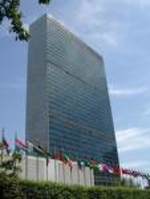Rewriting US National Security Strategy
Posted by Suzanne Nossel
I spent Wednesday and Thursday in DC for the launch of the Princeton Project on National Security's Final Report, entitled Forging a World of Liberty Under Law. I've reported some before on the Princeton Project. Over the last two years I co-chaired a working group on Anti-Americanism whose findings can be found here. The project is led by Anne-Marie Slaughter, Dean of the Woodrow Wilson School at Princeton and Professor John Ikenberry. They've done a masterful job in compiling a Report that's generating considerable press and attention on the Hill, in capitals around the world and - once a national tour begins - in America outside the Beltway.
On Wednesday I took on State Department Legal Adviser John Bellinger during a panel discussion on capital hill and this exchange was excerpted on the next day's All Things Considered
John Bellinger, the State Department’s legal advisor, just returned from Europe, where he says he explained and emphasized that the administration is trying very hard to, quote, “turn a new page.”
Mr. JOHN BELLINGER (U.S. State Department): I don’t think everything’s resolved, but what we’re trying to do to say to our allies is look at this as essentially as a glass that’s half full. That there’s an opportunity here for us to move forward and try to resolve some of these things, not that there has not been forward movement.
NORTHAM: Suzanne Nossel, a senior fellow at the Center for American Progress, says the administration’s policies, such as the new detainee bill, will further erode U.S. legitimacy among its allies.
Ms. SUZANNE NOSSEL (Center for American Progress): I frankly don’t think it’s going to be good enough to go to our allies and say that the positions we have, the policies we implement with respect to detainees and in other areas are not clearly wrong. That’s I think too low of a standard for us to use as our foundation to have the kind of influence that we want to around the world.
Bellinger had said that in talking to allies around the world, he defended US policies on detention as "not clearly wrong." My how far we have fallen.
But let's focus some on what's significant about the Princeton Report. In my view this:
Continue reading "Rewriting US National Security Strategy" »









